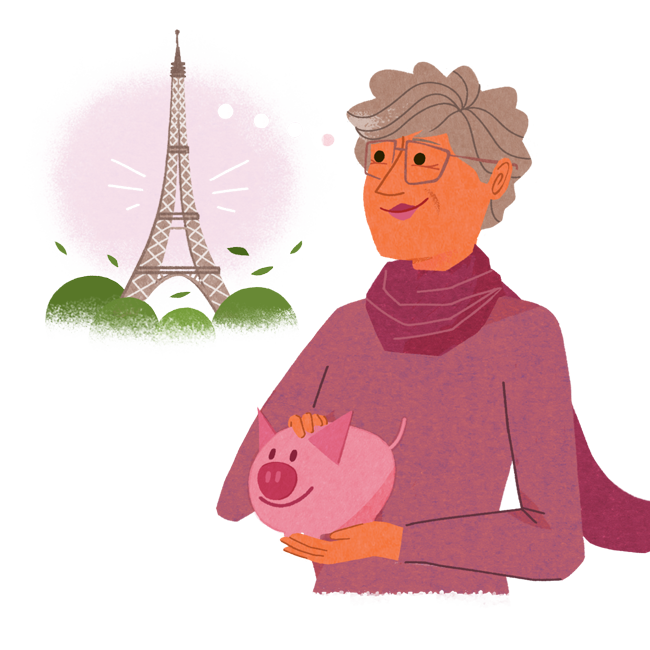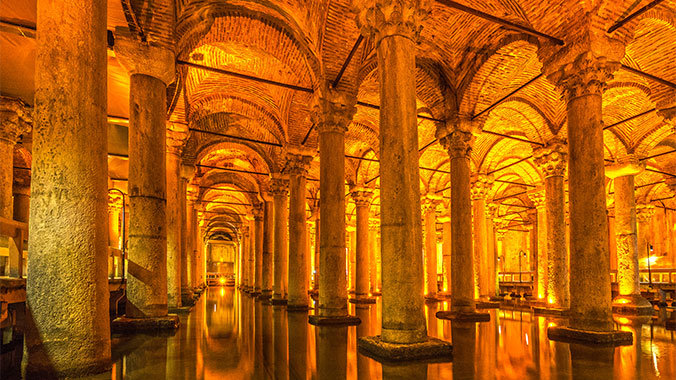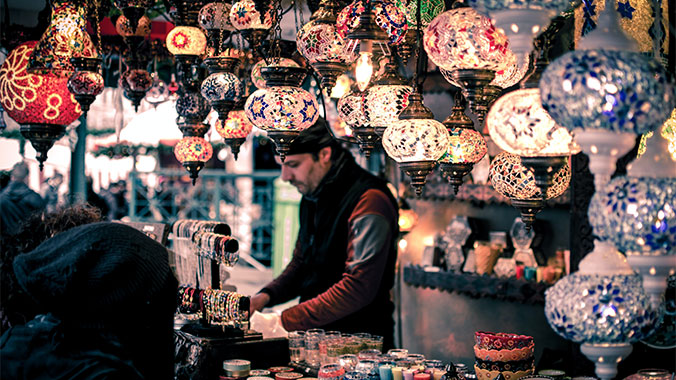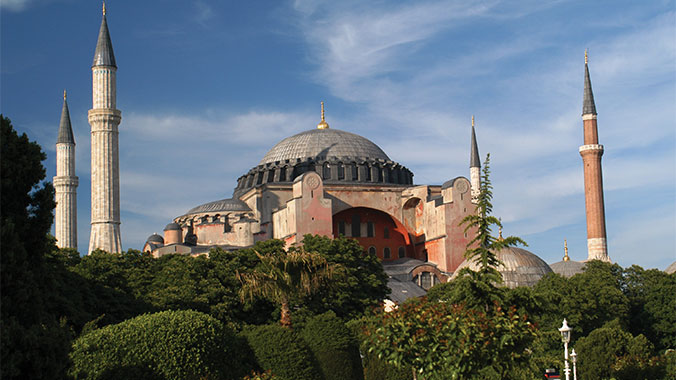A Short History Of Byzantium
by John Julius Norwich (Book)
No time to wade, albeit enjoyably, through his three volume Byzantium series? This recent edition is based on his Byzantium trilogy and is equally as intelligent and inspired. Norwich is, as always, ever entertaining and engaging about this subject. An efficient read without loss of style or spirit. If you can’t manage three volumes right now, this one is for you.
Birds Without Wings
by Louis de Bernières (Book)
In his first novel since Corelli’s Mandolin, Louis de Bernières creates a world, populates it with characters as real as our best friends, and launches it into the maelstrom of twentieth-century history. The setting is a small village in southwestern Anatolia in the waning years of the Ottoman Empire. Everyone there speaks Turkish, though they write it in Greek letters. It’s a place that has room for a professional blasphemer; where a brokenhearted aga finds solace in the arms of a Circassian courtesan who isn’t Circassian at all; where a beautiful Christian girl named Philothei is engaged to a Muslim boy named Ibrahim. But all of this will change when Turkey enters the modern world. Epic in sweep, intoxicating in its sensual detail, Birds Without Wings is an enchantment.
Constantinople; City of the World’s Desire, 1453-1924
by Philip Mansel (Book)
Mansel is a noted historian and author of several works about the Sultans and the Ottoman World. This book focuses on the political and architectural history of the capital Constantinople (modern day Istanbul) and covers the span of the Ottoman empire. The book ends on November 17, 1922 when the last Sultan and a small party slipped out of Palace at 8 AM and scrambled aboard a British naval ship that hauled anchor for Malta at 8:43 AM. A fine work, lots of detail, very readable and helpful in sorting out the complexities of 600 years of Ottoman power.
Crescent and Star: Turkey Between Two Worlds
by Stephen Kinzer (Book)
A passionate love for the Turkish people and an optimism that its ruling class can complete Turkey's transformation into a Western-style democracy mark Kinzer's reflections on a country that sits geographically and culturally at the crossroads between Europe and Asia. Kinzer, the former New York Times Istanbul bureau chief, gives a concise introduction to Turkey: Kemal Ataterk's post-WWI establishment of the modern secular Turkish state; the odd makeup of contemporary society, in which the military enforces Ataterk's reforms. In stylized but substantive prose, he devotes chapters to the problems he sees plaguing Turkish society: Islamic fundamentalism, frictions regarding the large Kurdish minority and the lack of democratic freedoms. Kinzer's commonsense, if naeve, solution: the ruling military elite, which takes power when it feels Turkey is threatened, must follow the modernizing path of Ataterk whom Kinzer obviously admires a step further and increase human rights and press freedoms. Kinzer's journalistic eye serves him well as he goes beyond the political, vividly describing, for instance, the importance and allure of the narghile salon, where Turks smoke water pipes. Here, as elsewhere, Kinzer drops his journalist veneer and gets personal, explaining that he enjoys the salons in part "because the sensation of smoking a water pipe is so seductive and satisfying." Readers who want a one-volume guide to this fascinating country need look no further.
Harem - The World Behind the Veil
by Alev Lytle Croutier (Book)
The author left Turkey at age 18 for the US, returning 15 years later to visit her birthplace and family. Intrigued upon learning that her grandmother had lived in a harem, she interviewed aunts and other family members about their recollections. About that same time (mid 1970’s) the Harem of Topkapi Palace was opened to visitors. With thoughtful research and richly illustrated, Croutier pieces together a realistic description of daily life in the Sultan’s Harem. Her fascinating insights into customs, food and ceremony of the Palace through 450 hundred years, make this an enjoyable read. The addition of family photographs and an amusing chapter about Western misconceptions of the term “harem” sets this work apart from all other books of its kind.
Istanbul (Poetry of Place)
by Ates Orga (Book)
Istanbul, capital of two great empires, confluence of Asia and Europe, has called forth poetry throughout her long history, from paupers and sultans, natives and visitors alike. When Mehmed the Conqueror first wandered through the ruins of the Byzantine palace, it was with the words of the Persian poet Ferdowsi on his lips: "The spider spins his web in the Palace of the Caesars/An owl hoots in the towers of Afrasiyab". Since then the silhouette of thousand-year-old domes and tapering minarets, the sunsets reflected nightly in a thousand palace windows and the bustle of her markets have inspired Sultan Suleyman, W B Yeats and Nazim Hikmet, amongst others, to salute one of the world's most remarkable cities.
Istanbul: Memories and the City
by Orhan Pamuk (Book)
Turkish novelist Pamuk (Snow) presents a breathtaking portrait of a city, an elegy for a dead civilization and a meditation on life's complicated intimacies. The author, born in 1952 into a rapidly fading bourgeois family in Istanbul, spins a masterful tale, moving from his fractured extended family, all living in a communal apartment building, out into the city and encompassing the entire Ottoman Empire. Pamuk sees the slow collapse of the once powerful empire hanging like a pall over the city and its citizens. Central to many Istanbul residents' character is the concept of hüzün (melancholy). Istanbul's hüzün, Pamuk writes, "is a way of looking at life that... is ultimately as life affirming as it is negating." His world apparently in permanent decline, Pamuk revels in the darkness and decay manifest around him. He minutely describes horrific accidents on the Bosphorus Strait and his own recurring fantasies of murder and mayhem. Throughout, Pamuk details the breakdown of his family: elders die, his parents fight and grow apart, and he must find his way in the world. This is a powerful, sometimes disturbing literary journey through the soul of a great city told by one of its great writers.
Istanbul: The Imperial City
by John Freely (Book)
Whether you call it Byzantium, Constantinople, or Istanbul, the “old Turkish hand” John Freely tells the story of each creation and decline up to today’s Istanbul under the Turkish Republic. Spirited and colorful, Freely gives his readers a lively account of the turmoil each incarnation brought. In addition to “page turning history”, Freely gives a complete listing of monuments & museums in the city - he has lived there for decades. This is the one to read on Istanbul if you have a short list of books and limited time to get into its history.
Tales from the Expat Harem: Foreign Women in Modern Turkey
by Anastasia M. Ashman, Jennifer Eaton Gokmen (Book)
As the Western world struggles to comprehend the paradoxes of modern Turkey, Tales from the Expat Harem reveals its most personal nuances. This illuminating anthology provides a window into the country from the perspective of thirty-two expatriates from seven different nations—artists, entrepreneurs, Peace Corps volunteers, archaeologists, missionaries, and others—who established lives in Turkey for work, love, or adventure. Through narrative essays covering the last four decades, these diverse women unveil the mystique of the “Orient,” describe religious conflict, embrace cultural discovery, and maneuver familial traditions, customs, and responsibilities. Poignant, humorous, and transcendent, the essays take readers to weddings and workplaces, down cobbled Byzantine streets, into boisterous bazaars along the Silk Road, and deep into the feminine stronghold of steamy Ottoman bathhouses. The outcome is a stunning collection of voices from women suspended between two homes as they redefine their identities and reshape their world views.
The Bastard of Istanbul
by Elif Shafak (Book)
In her second novel written in English (The Saint of Incipient Insanities was the first), Turkish novelist Shafak tackles Turkish national identity and the Armenian "question" in her signature style. In a novel that overflows with a kitchen sink's worth of zany characters, women are front and center: Asya Kazanci, an angst-ridden 19-year-old Istanbulite is the bastard of the title; her beautiful, rebellious mother, Zeliha (who intended to have an abortion), has raised Asya among three generations of complicated and colorful female relations (including religious clairvoyant Auntie Banu and bar-brawl widow, Auntie Cevriye). The Kazanci men either die young or take a permanent hike like Mustafa, Zeliha's beloved brother who immigrated to America years ago. Mustafa's Armenian-American stepdaughter, Armanoush, who grew up on her family's stories of the 1915 genocide, shows up in Istanbul looking for her roots and for vindication from her new Turkish family. The Kazanci women lament Armanoush's family's suffering, but have no sense of Turkish responsibility for it; Asya's boho cohorts insist there was no genocide at all. As the debate escalates, Mustafa arrives in Istanbul, and a long-hidden secret connecting the histories of the two families is revealed. Shafak was charged with "public denigration of Turkishness" when the novel was published in Turkey earlier this year (the charges were later dropped). She incorporates a political taboo into an entertaining and insightful ensemble novel, one that posits the universality of family, culture and coincidence.
The Turkish Letters of Ogier Ghiselin de Busbecq, Imperial Ambassador at Constantinople, 1554-1562
by Ogier Ghiselin de Busbecq (Book)
The Flemish nobleman wrote his Letters while on an ambassadorial mission to Istanbul between 1554 and 1562, making him a brilliant eye-witness of the Ottoman state at its height, under Sultan Suleyman the Magnificent. Busbecq was a botanist, linguist, antiquarian, scholar and zoologist; he brought back lilac and the tulip.











